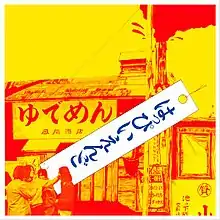Happy End (1970 album)
Happy End (Japanese: はっぴいえんど, Hepburn: Happī Endo) is the self-titled debut album by Japanese folk rock band Happy End. Because their third album is also self-titled, although written in English, this first album is also known by the name "Yudemen" (ゆでめん) after the sign depicted in the cover art.[1][2]
| Happy End | ||||
|---|---|---|---|---|
 | ||||
| Studio album by | ||||
| Released | August 5, 1970 | |||
| Recorded | April 9 – 12, 1970[1] | |||
| Studio | Aoi Studios | |||
| Genre | Folk rock | |||
| Length | 35:54 | |||
| Label | URC Records | |||
| Producer | Masaki Hata | |||
| Happy End chronology | ||||
| ||||
| Singles from Happy End | ||||
| ||||
Five bonus tracks were added when the album was included in the March 31, 2004 Happy End Box set.[3]
Lyrics
All the album's lyrics were written by Takashi Matsumoto, with the exception of "Tobenai Sora" (Haruomi Hosono) and "Ira Ira" (Eiichi Ohtaki).[4]
Michael K. Bourdaghs wrote that the first track "Haruyo Koi" ("Come, Spring!") is about "ordinary daily life in the city. Specifically, they take up the boredom of one who faces the New Year holiday alone, sitting by himself at his kotatsu after having abandoned his rural family home for a new life in the city."[5]
Reception
This album marked an important turning point in Japanese music history, as it sparked what would be known as the "Japanese-language rock controversy" (日本語ロック論争, Nihongo Rokku Ronsō). There were highly publicized debates held between prominent figures in the Japanese rock industry, most notably the members of Happy End and Yuya Uchida, regarding whether rock music sung entirely in Japanese was sustainable. Previously, almost all popular rock music in Japan was sung in English. The success of Happy End's debut album, as well as their following album Kazemachi Roman, proved the sustainability of Japanese-language rock in Japan.[6]
Julian Cope, English musician and author of Japrocksampler, referred to 1970's Happy End as clearly the band's best work.[7] Both Cope and HMV Japan noted similarities to work by Crosby, Stills, Nash & Young.[2][7]
Legacy
The song "Shin Shin Shin" inspired the 2013 film of the same name.[8]
The album cover was featured in the first episode of the 2017 anime Tsuki ga Kirei.
In 2021, photographer Mike Nogami released the photobook Yudemen containing pictures he took of Happy End during the recording of the album and an interview with Shigeru Suzuki.[1]
Track listing
| No. | Title | Lyrics | Music | Length |
|---|---|---|---|---|
| 1. | "Haruyo Koi" (春よ来い, "Come, Spring!") | Takashi Matsumoto | Eiichi Ohtaki | 4:17 |
| 2. | "Kakurenbo" (かくれんぼ, "Hide-and-seek") | Takashi Matsumoto | Eiichi Ohtaki | 4:32 |
| 3. | "Shin Shin Shin" (しんしんしん, "Newly-fallen Snow") | Takashi Matsumoto | Haruomi Hosono | 3:06 |
| 4. | "Tobenai Sora" (飛べない空, "Unflyable Sky") | Haruomi Hosono | Haruomi Hosono | 2:44 |
| 5. | "Kataki—Thanatos o Sōkiseyo!" (敵タナトスを想起せよ!, "Remember Your Enemy—Thanatos!") | Takashi Matsumoto | Haruomi Hosono | 3:00 |
| No. | Title | Lyrics | Music | Length |
|---|---|---|---|---|
| 6. | "Ayakashi no Dōbutsuen" (あやか市の動物園, "Ayaka City Zoo") | Takashi Matsumoto | Haruomi Hosono | 2:48 |
| 7. | "Juuni Gatsu no Ame no hi" (12月の雨の日, "A Rainy Day in December") | Takashi Matsumoto | Eiichi Ohtaki | 3:27 |
| 8. | "Ira Ira" (いらいら, "Nervousness") | Eiichi Ohtaki | Eiichi Ohtaki | 3:15 |
| 9. | "Asa" (朝, "Morning") | Takashi Matsumoto | Eiichi Ohtaki | 2:29 |
| 10. | "Happy End" (はっぴいえんど) | Takashi Matsumoto | Haruomi Hosono | 3:26 |
| 11. | "Zoku Happppy Eeeend" (続はっぴ-いいえ-んど, "Continued Happppy Eeeeend") | Takashi Matsumoto | Haruomi Hosono | 2:20 |
| No. | Title | Length |
|---|---|---|
| 12. | "Juuni Gatsu no Ame no hi (Unreleased Version)" (十二月の雨の日 (未発表ヴァージョン)) | 3:41 |
| 13. | "Juuni Gatsu no Ame no hi (Single Version)" (十二月の雨の日 (シングル・ヴァージョン)) | 3:19 |
| 14. | "Ira Ira (Long Fade-out Edit)" (いらいら (ロング・フェイド・アウト・エディット)) | 3:32 |
| 15. | "Asa (Take 3)" (朝 (テイク3)) | 2:32 |
| 16. | "Tegami ("Kaze wo Atsumete" Rehearsal Take)" (手紙 (「風をあつめて」リハーサル・テイク)) | 2:16 |
Personnel
- Haruomi Hosono - vocals, bass, keyboards, guitar
- Eiichi Ohtaki - vocals, guitar, 12-string guitar
- Shigeru Suzuki - lead guitar, celesta
- Takashi Matsumoto - drums, percussion
- Eiji Ogura - 12-string guitar, hand clapping
References
- "はっぴいえんど1stアルバム制作風景を写した写真集「ゆでめん」発売". Natalie (in Japanese). 2021-08-02. Retrieved 2021-12-25.
- "Top 100 Japanese pops Artists - No.4". HMV Japan (in Japanese). 2003-11-27. Retrieved 2016-04-17.
- "はっぴいえんどbox". HMV Japan (in Japanese). Retrieved 2016-01-09.
- "haruomi hosono: はっぴいえんど / はっぴいえんど". hosono.sblo.jp (in Japanese). Archived from the original on 2011-07-22. Retrieved 2010-01-05.
- Bourdaghs, Michael K. (2012). Sayonara Amerika, Sayonara Nippon: A Geopolitical Prehistory of J-pop. Columbia University Press. p. 173. ISBN 978-0-231-15874-9.
- TJ Mook Kike! Densetsu no Nihon Rokku 1969-79 TJ MOOK 聴け! 伝説の日本ロック1969-79 [TJ Mook Kike! Legendary Japanese Rock 1969-79]. Takarajima Press. 2004. p. 33. ISBN 4-7966-3862-8.
- "Happy End". Japrocksampler. Retrieved 2013-04-25.
- "はっぴいえんどの名曲から着想を得た映画「しんしんしん」". Natalie (in Japanese). 2012-12-06. Retrieved 2016-01-06.